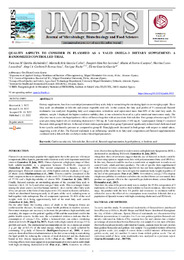Please use this identifier to cite or link to this item:
https://hdl.handle.net/11000/35222Full metadata record
| DC Field | Value | Language |
|---|---|---|
| dc.contributor.author | García-Hernández, Vanesa M. | - |
| dc.contributor.author | Beltrá García-Calvo, Marta | - |
| dc.contributor.author | Sánchez-Soriano, Joaquín | - |
| dc.contributor.author | Iborra-Campos, María A. | - |
| dc.contributor.author | Cano-Lamadrid, Marina | - |
| dc.contributor.author | Carbonell-Barrachina, Ángel A. | - |
| dc.contributor.author | Roche, Enrique | - |
| dc.contributor.author | García García, Elena | - |
| dc.contributor.other | Departamentos de la UMH::Biología Aplicada | es_ES |
| dc.date.accessioned | 2025-01-24T07:55:52Z | - |
| dc.date.available | 2025-01-24T07:55:52Z | - |
| dc.date.created | 2022-12-01 | - |
| dc.identifier.citation | Journal of Microbiology, Biotechnology and Food Sciences (JMBFS) 12(3), e5932 | es_ES |
| dc.identifier.issn | 1338-5178 | - |
| dc.identifier.uri | https://hdl.handle.net/11000/35222 | - |
| dc.description.abstract | Dietary supplements, based on essential polyunsaturated fatty acids, help in normalizing the circulating lipids in overweight people. These fatty acids are abundant in fish oils and certain vegetable seed oils. In this context, the fatty acid profile of 9 commercial flaxseed trademarks was analyzed. Regarding fatty acid composition, α-linolenic acid represented more than 60% of the total fatty acids. In addition, sample 3 displayed the highest oxidative stability; thus, it was selected to be used in a pilot nutritional intervention study. The objective was to assess the hypolipidemic effects of flaxseed together with an isocaloric fish-rich diet. Two groups of women aged 25-70 years presenting high levels of circulating cholesterol (> 200 mg dL-1 ) and triglycerides (>150 mg dL-1 ) participated. Group F consumed flaxseed, while group D did not. At the end of intervention, participants from group F presented significantly reduced total cholesterol and lower systolic and diastolic pressure as compared to group D. Triacylglycerols decreased in both groups with respect to initial values, suggesting a role of diet. The flaxseed trademark is an influencing variable in its fatty acid composition and flaxseed supplementation combined with a fish-rich diet can help to reduce blood lipid parameters. | es_ES |
| dc.format | application/pdf | es_ES |
| dc.format.extent | 5 | es_ES |
| dc.language.iso | eng | es_ES |
| dc.publisher | Slovak University of Agriculture in Nitra | es_ES |
| dc.rights | info:eu-repo/semantics/openAccess | es_ES |
| dc.rights | Attribution-NonCommercial-NoDerivatives 4.0 Internacional | * |
| dc.rights.uri | http://creativecommons.org/licenses/by-nc-nd/4.0/ | * |
| dc.subject | cardiovascular risk | es_ES |
| dc.subject | fish-rich diet | es_ES |
| dc.subject | flaxseed oil | es_ES |
| dc.subject | flaxseed supplementation | es_ES |
| dc.subject | hyperlipidemia | es_ES |
| dc.subject | α-linolenic acid | es_ES |
| dc.subject.other | CDU::5 - Ciencias puras y naturales::57 - Biología | es_ES |
| dc.title | Quality aspects to consider in flaxseed as a valid Omega-3 dietary supplement: a randomized controlled trial | es_ES |
| dc.type | info:eu-repo/semantics/article | es_ES |
| dc.relation.publisherversion | https://doi.org/10.55251/jmbfs.5932 | es_ES |

View/Open:
quality aspects omega-3.pdf
490,5 kB
Adobe PDF
Share:
.png)
